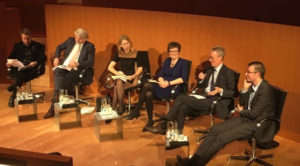
EU Commission President Ursula von der Leyen has identified three priorities: a geopolitical EU Commission, the development of a European Green Deal and a stronger global role for the EU. What opportunities and challenges arise from these priorities for EU development policy and for relations with Africa? How can these priorities be agreed with the AU-EU summit, the negotiations on the multiannual financial framework or the post-Cotonou agreement? And how can Germany help shape these debates as part of the EU Council Presidency in the second half of 2020? These questions were discussed on a panel organized by the German Development Institute / Deutsches Institut für Entwicklungspolitik (DIE) and the EU Commission representative in Germany on 19 December 2019 in Berlin.
Koen Doens, EU Commission Director for International Cooperation and Development (DG DEVCO) emphasized that, given the increasing pressure on multilateralism, Europe must act concurrently in different policy areas. The EU must overcome traditional donor-recipient structures and find mutual forms of cooperation. Christoph Rauh, Deputy-Director General for Africa at the German Federal Ministry for Economic Cooperation and Development, announced that Africa policy would be a central topic of the German EU Presidency and suggested that the model of reform partnerships be adopted at the European level. Eefje Schmid from the European Investment Bank emphasized that the EIB will also act as a climate bank outside the EU and especially in Africa to finance a just transformation towards sustainability. The Africa department head of Bread for the World, Reinhard Palm, focused on the importance of a value-based migration policy for the success of European development policy. Niels Keijzer (DIE) emphasized that the EU and its member states need to work much more closely together in development policy in order to make a significant difference in view of the global challenges. In conclusion, moderator Christine Hackenesch (DIE) argued that important steps will be taken in 2020 that will determine whether the EU can make its contribution to achieving the SDGs and the Paris Agreement by 2030.

Schreibe einen Kommentar